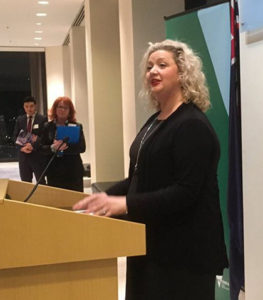DHHS launches new refugee health package, pilot internship program
A new package of health and human service programs for refugees and asylum seekers has been launched by the Victorian Government’s Department of Health and Human Services (DHHS).
Minister for Health and Ambulance Services Jill Hennessy MP and Minister for Mental Health Martin Foley MP addressed partners from across the sector this week at the Multicultural Hub in Melbourne.
Ms Hennessy said it was important to acknowledge the dedication and commitment of those who work in the sector every day.

Jill Hennessy
She said the Victorian Government is committed to helping people from refugee backgrounds in Victoria, including those currently seeking asylum.
The 2016-17 State Budget will invest an additional $10.9 million in refugee health services, in response to growing Syrian and Iraqi refugee settlement in Victoria.
“If we want Victoria to be the open, progressive capital of our nation, we need to do bold things and put our money where our mouth is,” Ms Hennessy said.
“Good health services for refugees should be at the core of the health system.
“We need to make sure we are designing services around community needs and giving people from refugee backgrounds the best chance at succeeding.”
Funding will be allocated predominately to health and human services in the north and north-west metropolitan area.
Components include $1.7 million invested over four years for the Refugee Health Program.
This includes the employment of experienced refugee health nurses at Dianella Health, Plenty Valley Community Health and ISIS Primary Care to provide orientation, triage and referral services for newly arrived refugees at settlement agency AMES Australia.
A new part-time paediatric specialist will also hold regular clinics for refugee families across the northern metropolitan area, managed by the Royal Children’s Hospital through their Refugee Health Fellows Program.
A $2.3 million catch-up immunisation program will also improve immunisation coverage for infants, children, adolescents and adults from refugee backgrounds.
Ms Hennessy said immunisation was an issue that she feels incredibly strongly about.
“We only have to look at developing countries and what happens when we don’t invest in comprehensive immunisation schedules,” she said.
Mr Foley said access to mental health services was also particularly important for refugees and asylum seekers.
“There is important work to undertake for those who have survived torture, trauma, and had their human rights trampled,” he said.
He announced that $2.7 million in funding over four years will provide newly arrived people from refugee backgrounds access to culturally responsive and trauma-informed mental health and psychosocial support.
A boost of $1.68 million to language services capacity in health and human services, and a $2.23 million boost to child and family services for unaccompanied refugee children and young people was included in the package.
DHHS are also currently piloting CareerSeekers, a non-profit social enterprise that works with organisations to create 12-week paid professional internship opportunities for asylum seekers and recently arrived refugees.
Internships are available under two streams: mid-career professionals who already have a tertiary qualification and professional experience, and university students who undertake placements in each year of their degree.
Ms Hennessy said the CareerSeekers program allows people from refugee backgrounds to engage in meaningful work.
The additional investment by the Andrews Government builds on existing efforts of around $11 million per year in targeted supports to improve long-term health and wellbeing outcomes for people from refugee backgrounds in Victoria.
It follows the Government’s original 2016-17 budget announcement in May this year.
Carissa Gilham
AMES Australia Staff Writer












